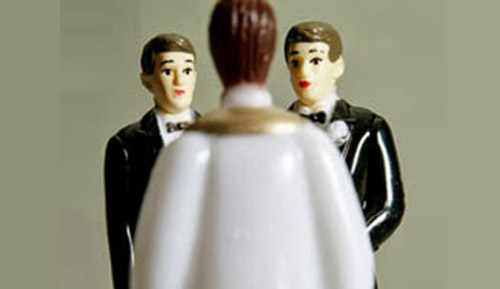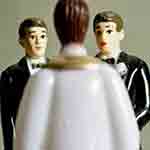
At our recent Christchurch diocesan synod, as well as (famously) deciding to reinstate the Cathedral in the Square, we discussed the interim report from the Motion 29 Working Group which suggests a structure within our Church which would “safeguard both theological convictions concerning the blessing of same gender relationships”.
One might be forgiven for thinking that the defining feature of Anglicanism now is debating same-sex relationships!
A strong line of the response in our synod was that because there is no change to Church teaching, it would open a cleft between teaching and practice. This has been forcefully expressed in the Media Release of the Fellowship of Confessing Anglicans New Zealand:
In short, under the report, only the practice of blessing is allowable, not the teaching about the blessedness of the union between two people of the same gender. This problem is brought about by the choice to leave the definition of a marriage in the formularies undisturbed…
Title G, Canon XIV currently ensures that any services performed in Anglican churches must be consistent with the Constitution and Formularies of our church. The proposed change allows services to occur that are acknowledged to be inconsistent with our Constitution and Formularies. This is an admission that whilst the Constitution and Formularies have not been changed, they are simply being avoided for the purposes of this issue. A Canon is being amended in such a way so as to avoid the operation of a fundamental provision of the Constitution. We question whether this is legally possible. And even if it is, is it right to do so, is there integrity in it?
What fascinates me is how this expresses so clearly and strongly the point I made in my Open Letter to Anglican Leaders – Is Marriage After Divorce Possible? In that letter I argue that we have done precisely that impossible cleaving of practice from teaching for the majority – heterosexuals. But we are unwilling to follow this same approach and logic with the minority – homosexuals.
Our church’s doctrine of marriage holds it to be between a man and a woman, life-long, and monogamous. Our Canon of Marriage, however, allows us to act as if marriage is not life-long by marrying people who are divorced.
What is further fascinating is that those who hold to the FCANZ argument, in response to blessing committed same-sex couples, abandon their own logic when it comes to heterosexuals and marriage being life-long.
I find that, in response to heterosexuals, they no longer refer to the Church’s teaching but argue, instead, from the Bible. Arguing from the Bible, of course, is perfectly fine – but it also needs to be seen as doing something differently. Church teaching may be drawn from the Bible and be shot through with Biblical referencing, but Church teaching also provides a lens through which the Bible is interpreted.
[Incidentally, a response to a Bible-only pro-remarriage-after-divorce argument may be found here]
If you appreciated this post, do remember to like the liturgy facebook page, use the RSS feed, and sign up for a not-very-often email, …




I don’t see how blessing same sex couples “would open a cleft between teaching and practice”.
We bless all sorts of relationships we don’t consider to be marriage.
This is solidly grounded in the ancient tradition of the Church.
https://en.wikipedia.org/wiki/Adelphopoiesis
Many Blessings
Yes, Chris, one interpretation of the action is that it is parallel to any number of blessings (house, someone taking religious vows,…), including blessings that Christians might disagree about (a warship,…)
Others would see a parallel in the Continental European practice of the State witnessing a marriage (the couple themselves being the ministers of the marriage) followed by the Church blessing such a commitment. It is this latter viewing that is controversial.
I understand that you are pressing for the former viewpoint.
Blessings.
Thanks Bosco,
In the Catholic Church, the later view seems to be one pushed by those opposed to state same sex marriage and who want to react against it but separating state marriage from Church marriage completely. That is not an approach I favor; the Church was marrying people long before the state got involved so the state ought to recognise our right to celebrate marriage without requiring that it’s own ceremonies be added on.
Many Blessings
I think we are similar in this approach, Chris. The Anglican Church has a list of people that cannot marry (because they are related). There was a move to have that canon changed to just reading “the same as forbidden by the State”. I opposed that change. The list may be the same – but should the State change its list, we, the Church, should pause before we take on the State’s changes. Blessings.
With the advent of more easily available divorce in the UK, Church of England clergy began remarrying divorcees. Bishops responded that this was contrary to church teaching and disciplined the clergy. However, it was pointed out that a minister of the Established Church was expected to solemnise any marriage permitted by the state. The breach had happened and all that remained was for the bishops to put in place various safeguards: clergy exercising conscience not to remarry divorcees, and clergy informing their bishop each time they marry a divorcee. Quite late in the legislative process on same-sex marriage, canon lawyers advised the bishops that, unless the new law explicitly forbade Church of England clergy from solemnising same-sex marriage, the clergy could and would do so. Thus, a second breach between teaching and practice was avoided, but the cost is high. As Australia votes on same-sex marriage, it seems Anglicans are woefully prepared to discuss this at any level other than the partisan.
Thanks, Gareth. This adds a fascinating thread. Prince Charles, presumed future Supreme Governor of the Church of England, couldn’t be married in the CofE, of which he will be the Supreme Governor, to Camilla, Duchess of Cornwall, because Camilla is divorced. But their State marriage was blessed by the Archbishop of Canterbury. [In my theology that is exactly what happens in every church wedding – the couple make vows to each other and their relationship is blessed]. I have no idea what the CofE thinks has occurred now with their future Supreme Governor. Is he married in the eyes of the CofE? Is it a different type of marriage? Blessings.
The absurdity is all the greater in that case because divorcees had been remarrying in churches for decades before Charles was advised that for him to do so would go against the teaching of the church. Even before we add same-sex marriage into the mix, the church’s teaching and practice on marriage is quite confused.
Any decent lawyer would quickly point out that UK same-sex marriage and different-sex marriage are different things, governed by completely different laws. If we were to have truly equal marriage, we would have to rewrite marriage law entirely rather than bolting on this addition.
I understand your division of the vows and blessing in such a way that a civil marriage followed by a church blessing is no different from a church wedding in sacramental terms. Yet practice suggests we do have a teaching that some unions may be blessed but not made in church.
Charles and Camilla is a great example of the absurdity of it all for many reasons, the infidelity and distasteful media-exposed relationship not least.
‘Husbands do not abandon your wives’ is what the bible/Jesus says?
But it is hard to be open-minded too i know when some people continually push the boundaries. It was easy when I was younger and people just went about their business quietly and just wanted their equal legal rights.
I am pretty liberal on the whole but even I am struggling with one local church where the pastor advocates ‘polyamory’ and she has two wives.
Maybe people’s ‘private lives’are private for a reason.
was interesting to read, thanks for the useful tips!